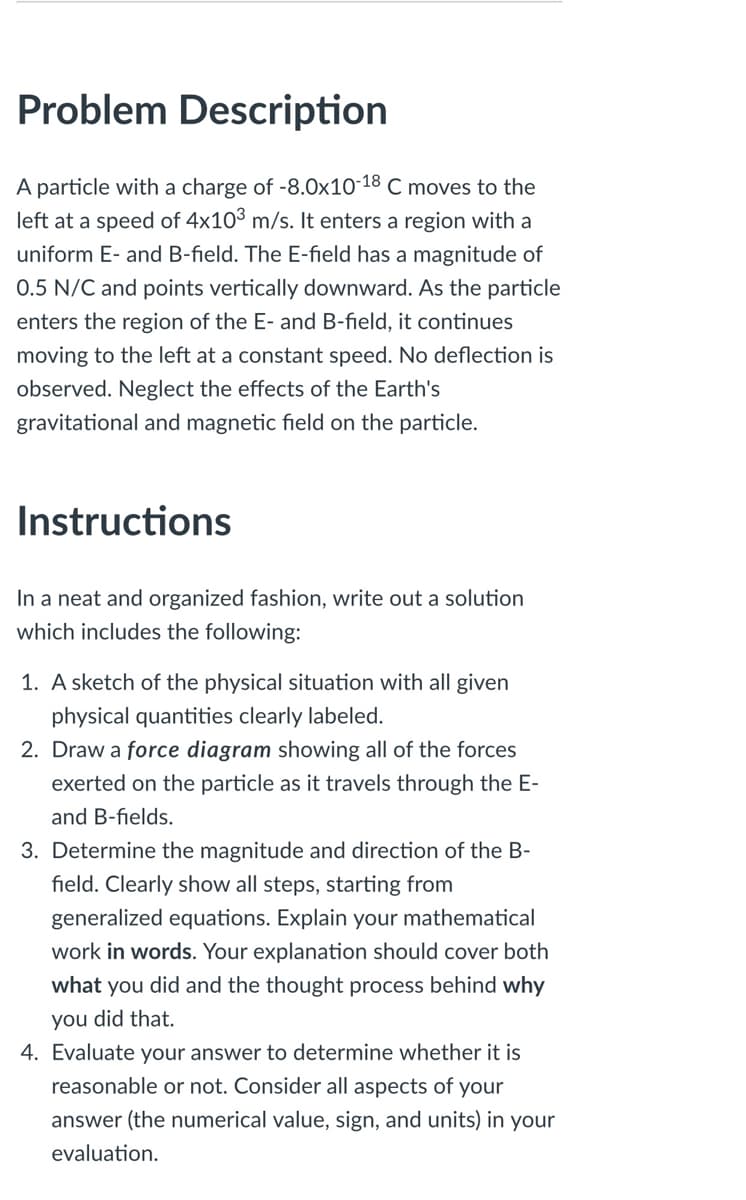Problem Description A particle with a charge of -8.0x10-18 C moves to the left at a speed of 4x10° m/s. It enters a region with a uniform E- and B-field. The E-field has a magnitude of 0.5 N/C and points vertically downward. As the particle enters the region of the E- and B-field, it continues moving to the left at a constant speed. No deflection is observed. Neglect the effects of the Earth's gravitational and magnetic field on the particle. Instructions In a neat and organized fashion, write out a solution which includes the following: 1. A sketch of the physical situation with all given physical quantities clearly labeled. 2. Draw a force diagram showing all of the forces exerted on the particle as it travels through the E- and B-fields. 3. Determine the magnitude and direction of the B- field. Clearly show all steps, starting from generalized equations. Explain your mathematical work in words. Your explanation should cover both what you did and the thought process behind why you did that. 4. Evaluate your answer to determine whether it is reasonable or not. Consider all aspects of your answer (the numerical value, sign, and units) in your evaluation.
Problem Description A particle with a charge of -8.0x10-18 C moves to the left at a speed of 4x10° m/s. It enters a region with a uniform E- and B-field. The E-field has a magnitude of 0.5 N/C and points vertically downward. As the particle enters the region of the E- and B-field, it continues moving to the left at a constant speed. No deflection is observed. Neglect the effects of the Earth's gravitational and magnetic field on the particle. Instructions In a neat and organized fashion, write out a solution which includes the following: 1. A sketch of the physical situation with all given physical quantities clearly labeled. 2. Draw a force diagram showing all of the forces exerted on the particle as it travels through the E- and B-fields. 3. Determine the magnitude and direction of the B- field. Clearly show all steps, starting from generalized equations. Explain your mathematical work in words. Your explanation should cover both what you did and the thought process behind why you did that. 4. Evaluate your answer to determine whether it is reasonable or not. Consider all aspects of your answer (the numerical value, sign, and units) in your evaluation.
Physics for Scientists and Engineers
10th Edition
ISBN:9781337553278
Author:Raymond A. Serway, John W. Jewett
Publisher:Raymond A. Serway, John W. Jewett
Chapter24: Electric Potential
Section: Chapter Questions
Problem 16P: Review. A light, unstressed spring has length d. Two identical particles, each with charge q, are...
Related questions
Question
Please answer all parts

Transcribed Image Text:Problem Description
A particle with a charge of -8.0x10-18 C moves to the
left at a speed of 4x10° m/s. It enters a region with a
uniform E- and B-field. The E-field has a magnitude of
0.5 N/C and points vertically downward. As the particle
enters the region of the E- and B-field, it continues
moving to the left at a constant speed. No deflection is
observed. Neglect the effects of the Earth's
gravitational and magnetic field on the particle.
Instructions
In a neat and organized fashion, write out a solution
which includes the following:
1. A sketch of the physical situation with all given
physical quantities clearly labeled.
2. Draw a force diagram showing all of the forces
exerted on the particle as it travels through the E-
and B-fields.
3. Determine the magnitude and direction of the B-
field. Clearly show all steps, starting from
generalized equations. Explain your mathematical
work in words. Your explanation should cover both
what you did and the thought process behind why
you did that.
4. Evaluate your answer to determine whether it is
reasonable or not. Consider all aspects of your
answer (the numerical value, sign, and units) in your
evaluation.
Expert Solution
This question has been solved!
Explore an expertly crafted, step-by-step solution for a thorough understanding of key concepts.
Step by step
Solved in 2 steps with 1 images

Knowledge Booster
Learn more about
Need a deep-dive on the concept behind this application? Look no further. Learn more about this topic, physics and related others by exploring similar questions and additional content below.Recommended textbooks for you

Physics for Scientists and Engineers
Physics
ISBN:
9781337553278
Author:
Raymond A. Serway, John W. Jewett
Publisher:
Cengage Learning

Principles of Physics: A Calculus-Based Text
Physics
ISBN:
9781133104261
Author:
Raymond A. Serway, John W. Jewett
Publisher:
Cengage Learning

Physics for Scientists and Engineers with Modern …
Physics
ISBN:
9781337553292
Author:
Raymond A. Serway, John W. Jewett
Publisher:
Cengage Learning

Physics for Scientists and Engineers
Physics
ISBN:
9781337553278
Author:
Raymond A. Serway, John W. Jewett
Publisher:
Cengage Learning

Principles of Physics: A Calculus-Based Text
Physics
ISBN:
9781133104261
Author:
Raymond A. Serway, John W. Jewett
Publisher:
Cengage Learning

Physics for Scientists and Engineers with Modern …
Physics
ISBN:
9781337553292
Author:
Raymond A. Serway, John W. Jewett
Publisher:
Cengage Learning

Physics for Scientists and Engineers, Technology …
Physics
ISBN:
9781305116399
Author:
Raymond A. Serway, John W. Jewett
Publisher:
Cengage Learning

College Physics
Physics
ISBN:
9781938168000
Author:
Paul Peter Urone, Roger Hinrichs
Publisher:
OpenStax College

College Physics
Physics
ISBN:
9781285737027
Author:
Raymond A. Serway, Chris Vuille
Publisher:
Cengage Learning